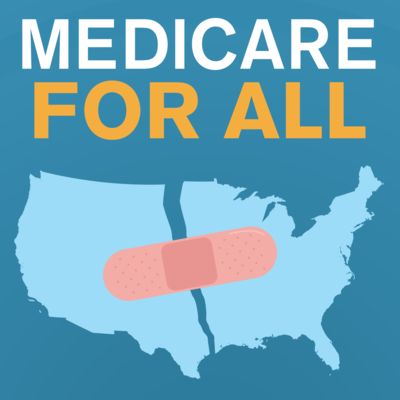episode 51: Billed at Birth: Maternal Healthcare
This Valentine's Day, we're showing some love for moms and other folks who have given birth by talking about one of the most important but least-discussed aspects of our current healthcare system: maternal healthcare. We’ll be sharing your stories about the good, the bad, and the ridiculously expensive, celebrating resilience, and getting fired up to change what it looks like to have a baby in this country! Since neither Ben nor Gillian have given birth, we brought in a Momspert: our guest is Claire in Kansas City, a Registered Dietician and mother of two. Disclaimer: We’re calling this “maternal” healthcare because that’s the term the majority of our listeners will recognize, but we recognize that not everyone who has a uterus is a woman, and not everyone who gives birth is a mom. Trans-men and non-binary folks have babies, and they can face even more challenging obstacles to accessing pre-natal and birthing care because they are already working with an extra layer of misunderstanding and discrimination. Show Notes BIRTH STORIES We asked our members for stories about giving birth in America, and our good friend Rebecca Wood, a long-time single payer activist, shared this with us: I went to the emergency room. My blood pressure was 190/110. I was diagnosed with severe preeclampsia and hospitalized. I spent the next few days sitting in the dark (light made my brutal headache worse) while daily bloodwork documented my slow deterioration. Meds were given. The peri-natalogist explained to me we were defusing a bomb. We needed to keep me pregnant until the very last minute I could to where it wouldn't harm me or the baby. I would be hospitalized until I had my baby. It could be days or, hopefully, it would be a month or so. After a few days, on Wednesday, the OB-GYN explained to me that I wasn't crashing fast enough for insurance to want to pay for me to be hospitalized and that I would have to go home on Friday. Horrified, I asked the peri-natalogist about it. She said that she had done this dance with preeclampsia hundreds of times and there was no way it was safe for me to be home. But, my OB-GYN insisted insurance said that I had to go home. Thursday night, my kidneys failed. … It was very clear now that I only had a matter of days until I delivered. I got to stay hospitalized.I think about how lucky I was my kidneys failed when they did. Otherwise, I would have gone home for the weekend. By Monday, Charlie and I were both dying because I developed HELLP syndrome over the weekend. On the Friday my kidneys failed, when it was clear Charlie was coming in a matter of days, I got a NICU consult. During the NICU consult, a neonatalogist came in my room, handed me a piece of paper with Charlie survival odds based on gestational age and weight. He asked if I had any questions. I had none because, it was all so surreal and overwhelming, I had no idea what to ask. The whole visit lasted two minutes and I was charge close to $400. My insurance wouldn't pay it because it wasn't my doctor. Charlie's insurance wouldn't pay it because she wasn't born yet. I think about all this a lot and it angers me. I think about how I was in the nation's capital and this was considered "good" health care with "good" insurance and I'm furious. If this is what it was like for me, what chance do mothers with lesser privilege have? Throughout the 20th century, maternal mortality rates have dropped rapidly due to improved living conditions, safer surgical procedures, etc. But in the late 1990s, the maternal mortality ratio (maternal deaths per 100,000 births) began to rise again. In 2018, U.S. maternal mortality ratio = 17.4 per 100k births, highest in any comparable “developed” country. Of course, in countries with national healthcare, those numbers are far lower: Canada: 8.6UK: 6.5Norway, the Netherlands, New Zealand: all under 3 As far back as we have data, a drastic disparity in maternal mortality has existed betwe...
